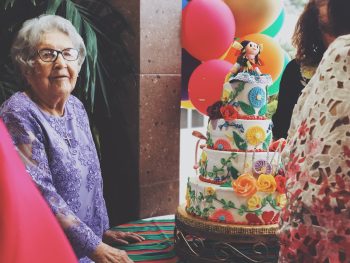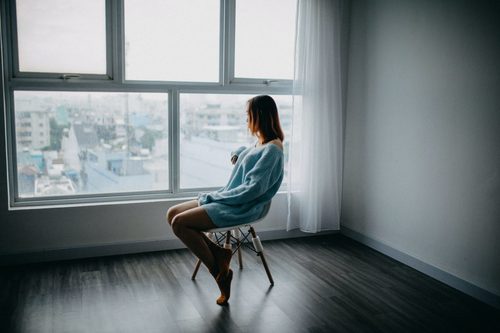The number of women experiencing chronic loneliness is on the rise. Here’s why – and what we can do to tackle it.
There are many things we expect to change as we get older (more laugh lines, needing stretchy waistbands and reading glasses…), but having no one to talk to is probably not one of them. So it may come as a surprise to learn that an epidemic of loneliness is affecting women, particularly from midlife onwards.
Despite living in an age in which we’re more ‘connected’ than ever (mobile phones, the internet, Facebook, Instagram and WhatsApp groups), the number of over-50s experiencing loneliness is set to reach two million by 2025/6, compared with around 1.4 million in 2016/7.

Image credit: Unsplash
According to the Campaign to End Loneliness, between December 2021 and February 2022, 3.3 million people said they felt chronically lonely or lonely all the time – and the majority were women.
This is worrying for many reasons.
Loneliness can lead to depression and anxiety and contributes towards dementia, high blood pressure, heart disease, alcoholism, sleep problems, obesity and a weakened immune system.
Research has found that loneliness is as bad for our health as smoking 15 cigarettes a day.
The issue is compounded by the fact that there is still a taboo about admitting we feel isolated.
As Dr Sandi Mann, a senior psychology lecturer at the University of Central Lancashire, points out: “Not having friends can feel like a personal failing, something to feel ashamed of. People don’t want to be seen as being needy or having to rely on other people.”
So what’s causing the current loneliness epidemic?
There’s no doubt that COVID-19 and perpetual lockdowns have put many of us on the back foot when it comes to going out and socialising again, and the trend to work from home has also meant losing vital connectivity and daily conversations.
Other triggers include empty-nest syndrome, divorce, bereavement, redundancy and caring for elderly parents.
While these are all common experiences during middle age, recent research shows that elder care disproportionately affects women, with 830 000 women unable to work because they are caring for an adult.

Image credit: Unsplash
Another factor affecting women is the often debilitating impact of menopause, which can usher in mood swings and wreak havoc with friendships and self-confidence.
After the age of 50, women disappear from social and cultural narratives, as ageing causes our appearances to change, triggering anxiety, a loss of confidence and a subsequent decrease in the desire to socialise.
Being proactive is key
But it’s not all doom and gloom. There are many things we can do to combat feelings of isolation and loneliness.
‘Firstly, remember there are lots of people feeling exactly the same as you,’ says Dr Mann. ‘The best thing you can do is seek opportunities to make connections with people wherever possible. This can be as simple as smiling at someone or saying ‘hello‘ when you are out – small changes can make a huge difference. Look for clubs, groups, classes or any activities where you can meet people who share your interests. Just changing one thing can be so rewarding.’
Being proactive is key
Pushing yourself to be sociable may not come easily, but being proactive is key. ‘You need to take the initiative to make new friends. Even if you’re an introvert, try to fake it until you make it!’, says Dr Mann.
There are now many organisations aiming to help people tackle feelings of isolation.
Look out for local groups on social media, contact charities for advice, and check out online sites such as Meetup to find support and local social activities.
Here are some social activities you can find on Daddy’s Deals:
- Guided Quad-Biking Tour
- 1-hour jump session plus a round of glow-in-the-dark golf
- An Introductory Scuba Diving Course for 1
- An Archery Experience
Whatever you do, don’t despair. Everyone experiences loneliness at some point or another, and it can be precisely these feelings that spur us on to make positive decisions to follow new and exciting paths.
If that sounds overwhelming, try asking yourself what small thing you could possibly do that will make you feel better about yourself today. That could be through a trip to the shops, a phone call to a friend, signing up to volunteer at your local food bank or joining a club.
Facing up to loneliness is the best way to knock it on the head.
ALSO SEE:
Featured image: Unsplash
Originally published in the April issue of Woman&Home Magazine.

